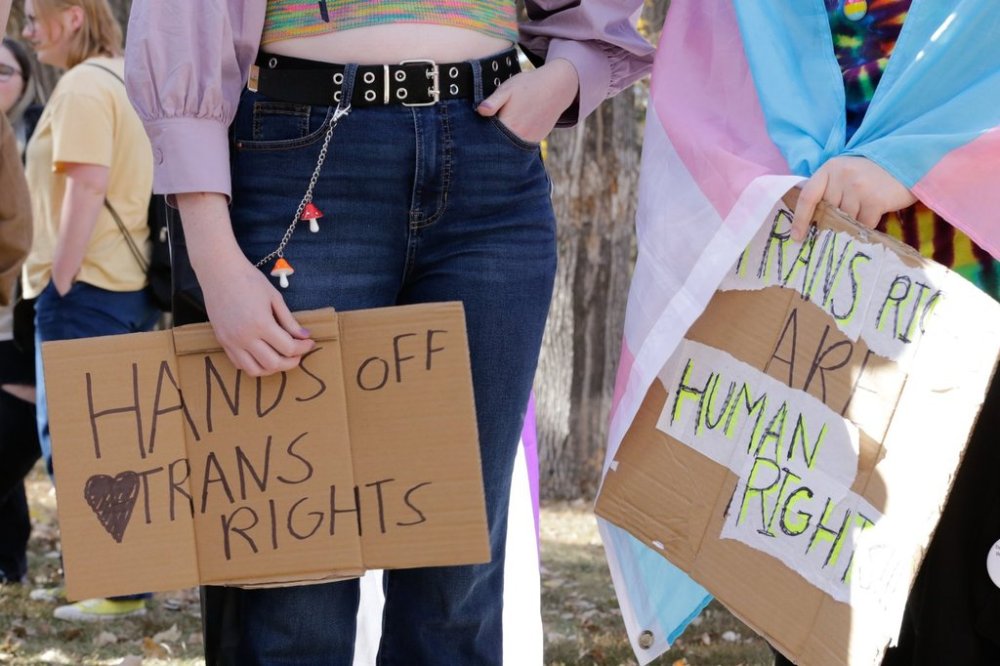Saskatchewan requests Supreme Court of Canada hear its appeal to pronoun law quickly
Advertisement
Read this article for free:
or
Already have an account? Log in here »
To continue reading, please subscribe:
Monthly Digital Subscription
$0 for the first 4 weeks*
- Enjoy unlimited reading on winnipegfreepress.com
- Read the E-Edition, our digital replica newspaper
- Access News Break, our award-winning app
- Play interactive puzzles
*No charge for 4 weeks then price increases to the regular rate of $19.00 plus GST every four weeks. Offer available to new and qualified returning subscribers only. Cancel any time.
Monthly Digital Subscription
$4.75/week*
- Enjoy unlimited reading on winnipegfreepress.com
- Read the E-Edition, our digital replica newspaper
- Access News Break, our award-winning app
- Play interactive puzzles
*Billed as $19 plus GST every four weeks. Cancel any time.
To continue reading, please subscribe:
Add Free Press access to your Brandon Sun subscription for only an additional
$1 for the first 4 weeks*
*Your next subscription payment will increase by $1.00 and you will be charged $16.99 plus GST for four weeks. After four weeks, your payment will increase to $23.99 plus GST every four weeks.
Read unlimited articles for free today:
or
Already have an account? Log in here »
REGINA – Saskatchewan’s government is hoping the Supreme Court of Canada will quickly hear its appeal to a ruling on the province’s school pronoun law, citing the legal case as one of national importance.
The province is seeking leave to appeal after the Saskatchewan Court of Appeal ruled a challenge of the law, which prevents children under 16 from changing their names or pronouns at school without parental consent, can continue.
Premier Scott Moe’s Saskatchewan Party government had invoked the Charter’s notwithstanding clause in the law, a provision that overrides certain Charter rights for five years.

In the province’s application to the Supreme Court this month, it says the case raises questions over whether courts can review and make declarations that a law limits Charter rights when the notwithstanding clause is invoked.
The province says it’s asking Canada’s highest court to expedite the process so its case could be heard alongside a challenge of Quebec’s law that prevents public sector workers, such as including teachers and judges, from wearing religious symbols on the job.
The Quebec government had also invoked the notwithstanding clause when it passed the law.
Moe’s Saskatchewan Party government introduced the pronoun rules in 2023, arguing parents should be involved in decisions their children make at school.
Lawyers for UR Pride, a LGBTQ+ group in Regina, challenged the rules in court arguing it causes irreparable harm to gender diverse youth.
After hearing both arguments, a judge granted an injunction in September that year to halt the rules. But a month later, Moe’s government put the rules into law, invoking the notwithstanding clause, during a special sitting of the legislature.
Moe’s government had also appealed the judge’s initial ruling at the Court of Appeal, arguing the case should be thrown out because his government invoked the clause.
Last month, the appeal court ruled the legal challenge of the pronoun law could continue.
In the ruling, four of five judges agreed the court has jurisdiction to issue a declaratory judgement on the law. Such a judgment would not strike down the legislation but provide a statement on whether it violates constitutional rights.
In a letter to the Supreme Court earlier this month, lawyers for UR Pride said they also plan to seek leave to appeal later this week.
The lawyers also said they want the case expedited and heard alongside the challenge of Quebec’s religious-symbols law.
In neighbouring Alberta, Premier Danielle Smith has said her government might invoke the notwithstanding clause to defend laws affecting transgender people.
A government memo, obtained by The Canadian Press, says Alberta plans to apply the clause this fall to its three laws that police school pronouns, female sports and gender-affirming health care.
This report by The Canadian Press was first published Sept. 23, 2025.


